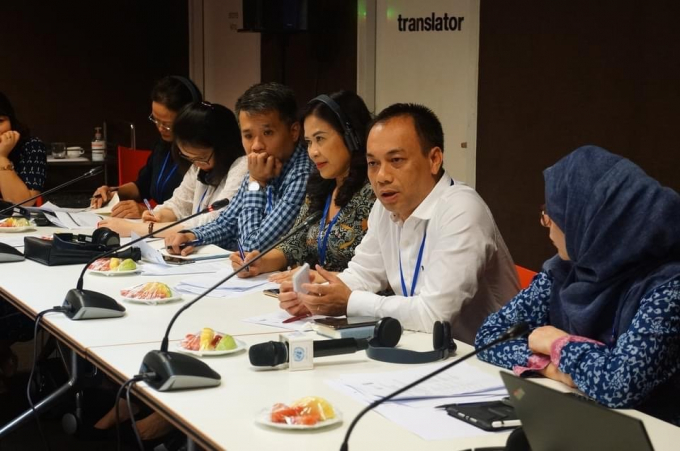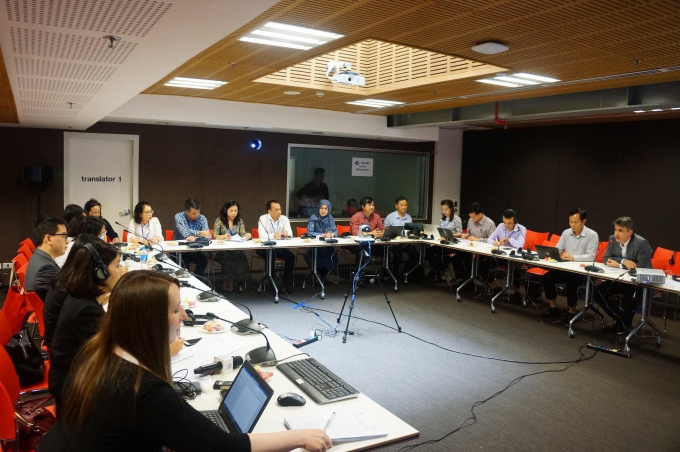June 21, 2025 | 01:14 GMT +7
June 21, 2025 | 01:14 GMT +7
Hotline: 0913.378.918
June 21, 2025 | 01:14 GMT +7
Hotline: 0913.378.918

Delegates at the workshop.
The workshop aimed to gain a comprehensive understanding of the Vietnamese context and identify the possible interventions and technical support needed for the country, which has been selected as one of the first ten countries to participate in a new UNDP global initiative under its new Insurance and Risk Finance Facility (IRFF) to make inclusive insurance and risk financing central to development.
This new initiative has been designed jointly with the Insurance Development Forum (IDF) and is financially supported by the Government of Germany. UNDP will also work with the InsuResilience Solutions Fund (ISF) and global insurance industry partners to develop new disaster risk financing and insurance products to reduce the negative impacts of disasters.
Risk financing and inclusive insurance are important to protect lives, livelihoods, infrastructure and homes from the impact of disasters, but also to provide coverage for sustainably protecting healthcare and education services, as well as employment, and agricultural supply chains. However, little attention has been paid to risk financing at the global and country levels. There is, for example, a huge protection gap in developing countries (including Viet Nam), where less than five percent of losses due to disasters are covered by insurance, as compared to over 50 percent in high-income countries. These protection gaps are also prevalent beyond disaster losses, resulting in increased expenses in healthcare and losses in property, livelihoods, and agriculture.
Research into multi-aspect disaster risk financing suggests that different insurance schemes could potentially reduce losses from disasters in the poorest countries by as much as 25 percent through a range of risk financing tools, including parametric insurance, insurance-backed social protection, and indemnity-based products.
As a first step in the unfolding of this new initiative in Viet Nam, UNDP is carrying out a diagnostic study. The study, which will cover significant areas across the inter-related disciplines of insurance and risk finance, will help to articulate the evolution of the insurance supply side; develop a picture of the demand side; ascertain the gaps and opportunities in creating an enabling environment through government policy and regulatory environment; recommend means of building regulatory capacities; assess the financial standing of the insurance companies; and suggest suitable approaches towards developing new market opportunities. It will also help to generate an information profile for Viet Nam and the knowledge relevant for inclusive insurance, such as providing the demographic, socio-economic, and sectoral context for developing insurance and risk transfer solutions.

Delegates at the workshop.
According to Ms. Sitara Syed, UNDP Deputy Resident Representative in Viet Nam, who spoke at the workshop, “the concept of disaster risk financing is still a relatively new concept in Viet Nam, but the opportunities are considerable. In addition to putting national and local governments in a stronger position to plan for disasters ahead of time, a more enabling environment could also support quicker and more efficient response and recovery work for when disasters inevitably occur.”
“This initiative will require a significant level of support and collaboration with government ministries, such as Ministry of Finance, as well as provincial and local authorities, development partners, insurance industry partners and the private sector,” highlighted Ms. Syed.

(VAN) The waste of resources from agricultural by-products and the situation of counterfeit and poor quality goods in production causing losses of thousands of billions were pointed out by the National Assembly deputy.

(VAN) After 5 years of implementation, the CAI initiative has helped coffee growers change their farming practices, moving toward responsible agriculture that meets global export standards.

(VAN) The primary prerequisite for the comprehensive and robust integration of Vietnam's livestock sector into the global value chain is the establishment of a disease control system.

(VAN) The results of national programs are essential for establishing a contemporary livestock sector that is well-equipped to meet the demands of both domestic and international markets, with robust biosafety standards.

(VAN) The UNESCO Global Geopark revalidation of Non nuoc Cao Bang and the transition to a two-tier administrative model are presently undergoing a pivotal moment in Cao Bang, the northernmost province of Vietnam.
/2025/06/13/5330-2-004539_953.jpg)
(VAN) Changing policy mindset and removing investment barriers are urgent requirements to open up new development space for enterprises in the agricultural sector.

(VAN) The areas include the restoration of five million hectares of marine ecosystems.